Unit 12What did you do last weekend Section B 2a-2c 课件+音频(共40张PPT)人教版英语七年级下册
文档属性
| 名称 | Unit 12What did you do last weekend Section B 2a-2c 课件+音频(共40张PPT)人教版英语七年级下册 | 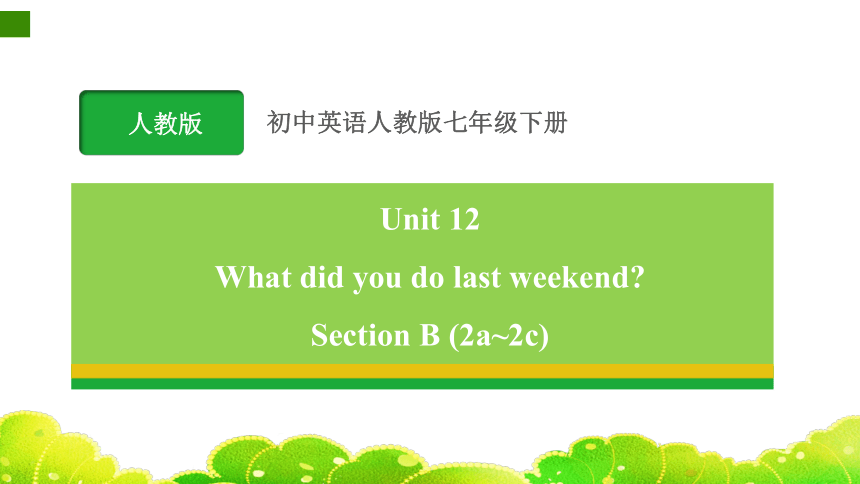 | |
| 格式 | pptx | ||
| 文件大小 | 8.8MB | ||
| 资源类型 | 教案 | ||
| 版本资源 | 人教新目标(Go for it)版 | ||
| 科目 | 英语 | ||
| 更新时间 | 2024-01-01 19:46:42 | ||
图片预览

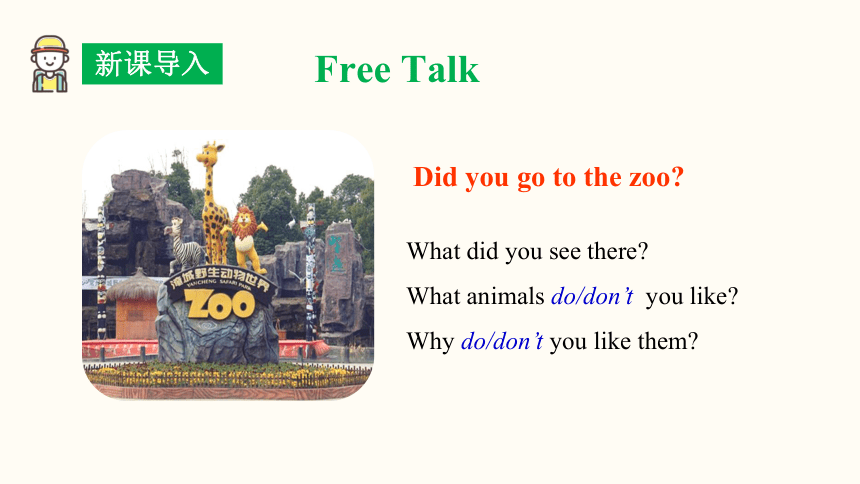
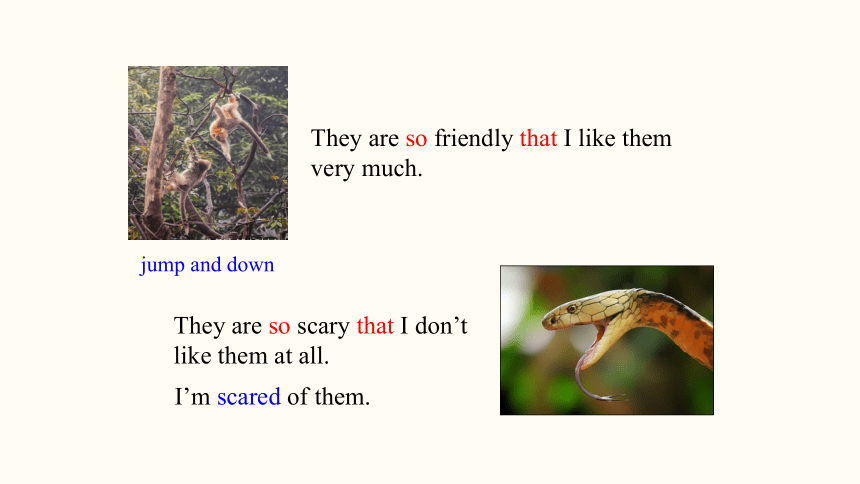

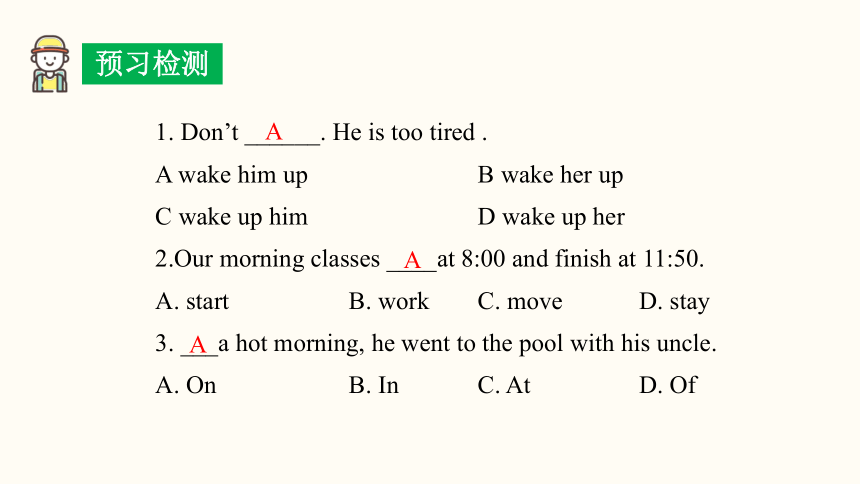
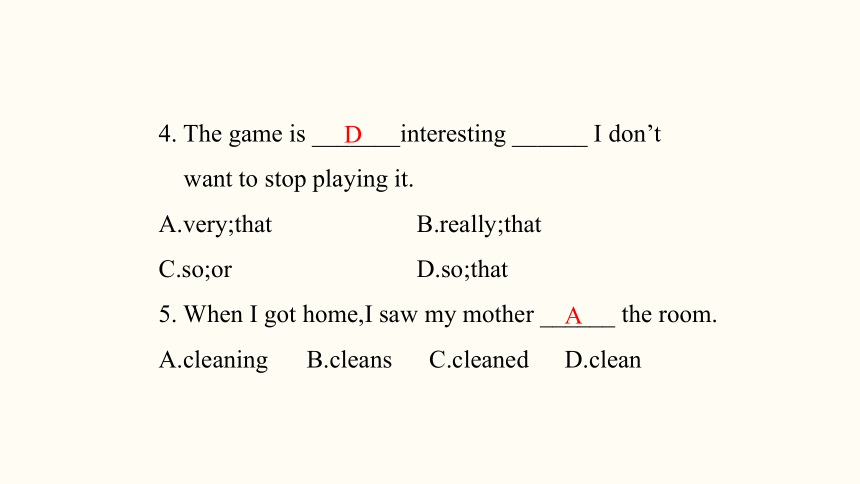
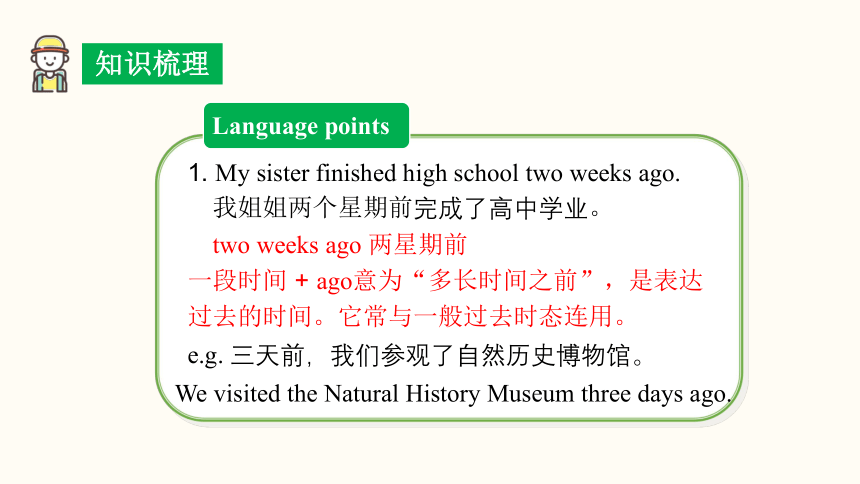
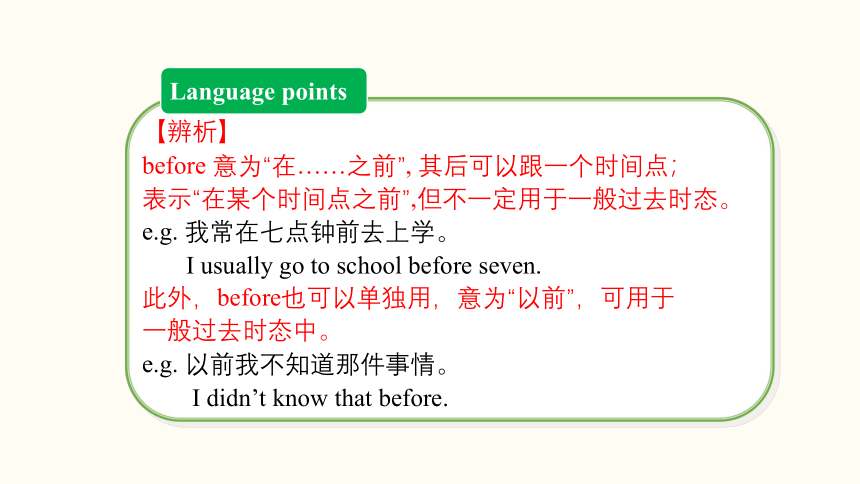
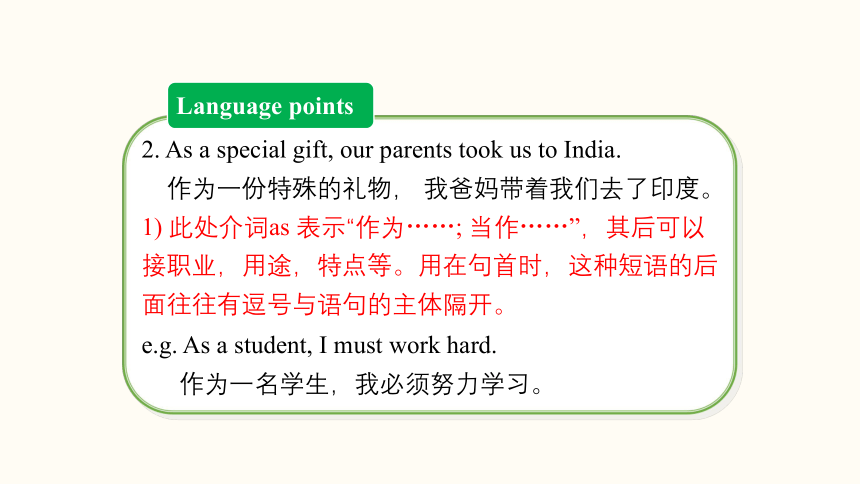
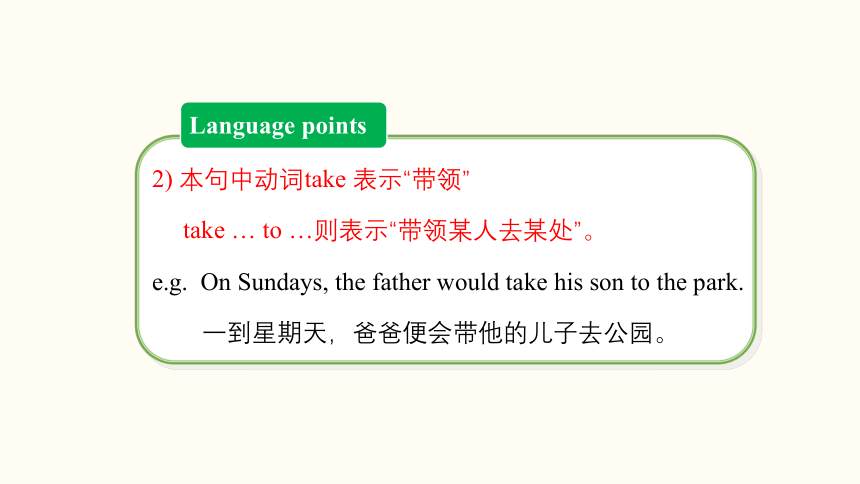
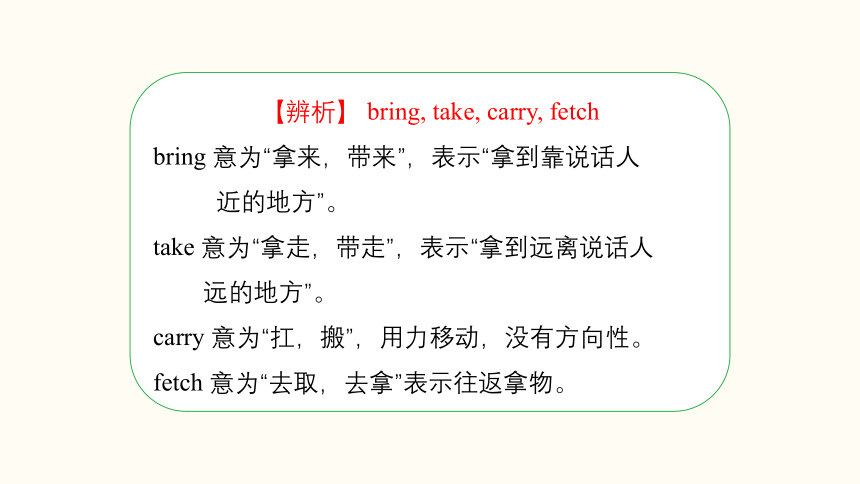
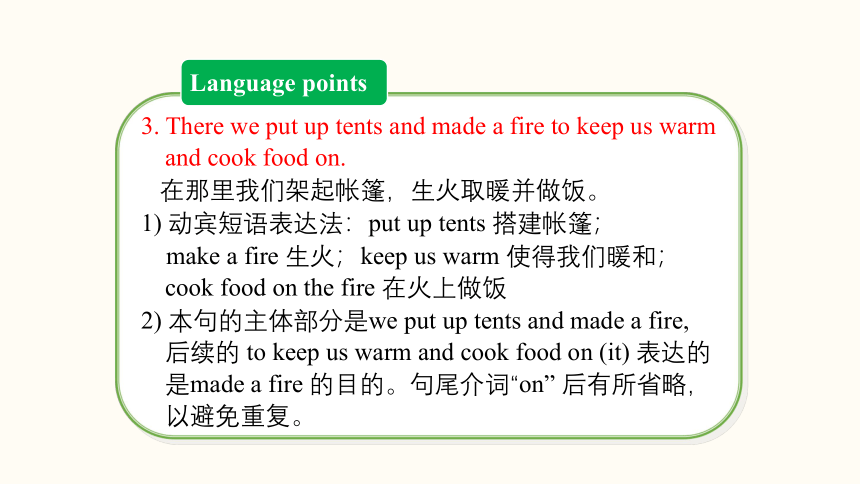
文档简介
(共40张PPT)
Unit 12
What did you do last weekend
Section B (2a~2c)
新课导入
Free Talk
Did you go to the zoo
What did you see there
What animals do/don’t you like
Why do/don’t you like them
They are so friendly that I like them very much.
They are so scary that I don’t like them at all.
I’m scared of them.
jump and down
1
2
能熟记并能正确运用本课时的重点单词和短语
能用过去时讲述旅行经历
3
能用不同的阅读策略完成相关阅读任务
预习检测
1. Don’t ______. He is too tired .
A wake him up B wake her up
C wake up him D wake up her
2.Our morning classes ____at 8:00 and finish at 11:50.
A. start B. work C. move D. stay
3. ___a hot morning, he went to the pool with his uncle.
A. On B. In C. At D. Of
A
A
A
4. The game is _______interesting ______ I don’t
want to stop playing it.
A.very;that B.really;that
C.so;or D.so;that
5. When I got home,I saw my mother ______ the room.
A.cleaning B.cleans C.cleaned D.clean
D
A
知识梳理
Language points
1. My sister finished high school two weeks ago.
我姐姐两个星期前完成了高中学业。
two weeks ago 两星期前
一段时间 + ago意为“多长时间之前”,是表达
过去的时间。它常与一般过去时态连用。
e.g. 三天前,我们参观了自然历史博物馆。
We visited the Natural History Museum three days ago.
Language points
【辨析】
before 意为“在……之前”, 其后可以跟一个时间点;
表示“在某个时间点之前”,但不一定用于一般过去时态。e.g. 我常在七点钟前去上学。
I usually go to school before seven.
此外,before也可以单独用,意为“以前”,可用于
一般过去时态中。
e.g. 以前我不知道那件事情。
I didn’t know that before.
Language points
2. As a special gift, our parents took us to India.
作为一份特殊的礼物, 我爸妈带着我们去了印度。
1) 此处介词as 表示“作为……; 当作……”,其后可以接职业,用途,特点等。用在句首时,这种短语的后面往往有逗号与语句的主体隔开。
e.g. As a student, I must work hard.
作为一名学生,我必须努力学习。
Language points
2) 本句中动词take 表示“带领”
take … to …则表示“带领某人去某处”。
e.g. On Sundays, the father would take his son to the park.
一到星期天,爸爸便会带他的儿子去公园。
【辨析】 bring, take, carry, fetch
bring 意为“拿来,带来”,表示“拿到靠说话人
近的地方”。
take 意为“拿走,带走”,表示“拿到远离说话人
远的地方”。
carry 意为“扛,搬”,用力移动,没有方向性。
fetch 意为“去取,去拿”表示往返拿物。
Language points
3. There we put up tents and made a fire to keep us warm and cook food on.
在那里我们架起帐篷,生火取暖并做饭。
1) 动宾短语表达法:put up tents 搭建帐篷;
make a fire 生火;keep us warm 使得我们暖和;cook food on the fire 在火上做饭
2) 本句的主体部分是we put up tents and made a fire, 后续的 to keep us warm and cook food on (it) 表达的是made a fire 的目的。句尾介词“on” 后有所省略,以避免重复。
Language points
4. On the first night, … 在头一天夜里,……
表示一天中的时间分别采用at night (在夜里)、
in the morning (在上午)、in the evening (在下午)等,但表示“在某一天上午、下午或晚上等”的特定时间,往往使用介词on。
e.g. On the early morning of November 20th, we got a
special postcard. 在11月20号一大清早,
我们收到了一张特殊的明信片。
Language points
5. … we saw a big snake sleeping near the fire.
My dad told me later that snakes … can feel things moving. 表示感官的动词,例如see, hear, feel 等动词后可以接动词-ing 短语,表示“看见、听到、觉得某人或物在做……(某事)”。
e.g. I can hear the children singing in the classroom.
我能听见孩子们在教室里唱歌。
Language points
6. This woke the snake up and it moved into the forest near the lake.
这叫醒了蛇,它进入了湖附近的森林。
wake up 唤醒; 后面可以跟名词或代词; 跟名词时可以放在
wake up的后面或中间;如果跟代词应放于 wake up 的中间。
e.g. 早上你常什么时候醒来?
When do you usually wake up
不要如此大声说话,你会将他们吵醒。
Don’t speak so loud. You’ll wake them up.
探究一
读文章完成阅读任务
2a What kinds of animals are people sometimes
afraid of Why Make a list.
I think people are afraid of tigers, lions and snakes because they’re scary.
mouse
spider
snake
lion
wolf
tiger
Living habits
(food, place)
How to walk
How to hear
Look
Symbol
Pre-reading: Brainstorm
The snake lives in the forest.
The snakes don’t have ears,
but can feel things moving.
The snakes don’t have feet,
it walks by bending its body
from side to side.
the symbol of Xiaolong.
March 3 is the day to celebrate the snake out of the hole. It is called "Dragon's Head.
Snakes like to eat live animals.
It looks scary.
Where did they go camping
In a forest near the lake.
These are Lucy and her friend. They went camping last weekend .
The air is so clean that they want to go there.
Where did they live during the trip
They slept in the tent.
What did they do during the trip
put up tents
make a fire
to
keep warm and cook food on
Read the title and the picture. Predict (预测)what the passage about.
1. An interesting but scary camping trip
2. An scary snake
3. A happy weekend.
√
A Weekend to Remember
Before-reading
Why is a memorable weekend ?
(值得记忆的)
meaningful
special
learn something from it.
unusual
A Weekend to
Remember
1. Where did Lisa and her family go last weekend
2. Why did Lisa and her sister get a terrible surprise
3. Where did the snake go at last
Listen carefully and answer the questions.
They went camping in a small village in India.
They saw a big snake sleeping near the fire.
It moved into a forest.
Listening
1. What is the passage(文章)about
A. Lisa visited her sister in India.
B. They played with a snake.
C. Lisa went camping with her family.
O
去野营
Fast-reading
2. Match each paragraph with the main idea.
Para1
Para2
Para3
interesting but scary weekend
a happy but tired day
a scary but useful day
Fast-reading
My sister finished high school two weeks ago. As a special gift, our parents took
us to India. Last weekend
was interesting but scary.
A Weekend to Remember
Read paragraph 1 carefully and answer the questions.
Careful-reading
1. How was Lisa's weekend
2. Where did Lisa and her family go
3. Why did Lisa go there
It was interesting but scary.
They went to a small village in India.
Because her sister finished high school .
Read para. 1 carefully and answer the questions.
Ask and answer the questions
We went camping in a small village in India. First,we took a long bus ride to a lake in the countryside. There we put up our tents and made a fire to keep us warm and cook food on. On the first night,we just sat under the moon and told each other stories. But I was so tired that I went to sleep early.
Read para. 2 carefully and answer the questions.
Careful-reading
1. Where did Lisa go camping last weekend
2. How did they go there
3. What did they do during the daytime
4. What did they do on the first night
5. How was their first day
In a small village in India.
By bus.
They put up tents , made a fire and cook food.
They sat under the moon and told each other stories.
Tired but happy.
Ask and answer the questions
But I was so tired that I went to sleep early.
但是我太累了,所以早早就睡着了。
I was so scared that I couldn’t move.
我是那么害怕,一动都不敢动。
“so +形容词+that 句子”,表示“太……以至于……”。
e.g. The game is so interesting that I don’t want to stop playing it. 这个游戏是如此有意思,以至于我都不想停下来。
The soup was so delicious that he drank it up.
汤是那么好喝,于是他喝了个精光。
【辨析】 so that / so… that
1)so that引导目的状语从句时,表示“以便;为了”。
e.g. I got up early so that I could catch the early bus.
我早起是为了搭乘早班车。
2) so +形容词或副词+ that ...引导结果状语从句,意思
是“如此……以致于……”。
e.g. He runs so fast that nobody can catch up with him.
他跑得非常快,没人能追上他。
The next morning, my sister and I got a terrible surprise. When we looked out of our tent, we saw a big snake sleeping near the fire. I was so scared that I couldn’t move. We shouted to our parents to let them know about the danger. My dad started to jump up and down in their tent. This woke the snake up and it moved into the forest near the lake. My dad told me later that snakes don’t have ears but can feel things moving. He also told me it was important not to go near a snake. This was a very useful lesson for me.
Read para. 3 carefully and answer the questions.
Careful-reading
1. How did Lisa feel when she saw the snake
2. What did Lisa and her sister do
3. What did their father do
4. Why did he do that
5. What lesson did Lisa learn from the weekend
Read paragraph 3 carefully and answer two questions.
She felt very scared.
They shouted to their parents.
Her father jumped up and down in their tent.
He wanted to wake up the snake.
Snakes don’t have ears but they can feel things
moving. It’s important not to go near a snake.
Ask and answer the questions
snake went in to the forest
learned a useful lesson
1 saw a snake near the fire
started to jump up and down
shouted to parents for help
snakes can't hear but can feel things moving
woke the snake up
2
3
4
5
6
7
Read para.3 again and put the phrases in order.
Careful-reading
2c Put the phrases in order according to the
passage. Then use them to retell the story.
___ snake went into the forest
___ put up our tents and cooked food
___ learned a useful lesson
___ saw a snake and shouted to parents for help
___ snakes can’t hear but they can feel things moving
___ my dad jumped up and down in his tent
___ took a bus to a small village in India
___ told stories under the moon, then went to sleep
2
4
6
7
8
1
3
5
how
who
what
why
when
where
Where did she go
How was Lisa’s weekend
Who did she go with
What did she do
Why was her weekend interesting
Why was her weekend scary
When did she go
Retall the story
be calm
(保持冷静)
don't disturb it
(不要惊扰)
How to save ourselves when we meet scary animals
当堂检测见DCF课件
活动小结
“so...that...”句型的意思是1._____________________,常引导结果状语从句。so... that...句型中的so是副词,常常用来修饰2.______________,常用句型为3.________________________________
如此/这么……以致于……
形容词或副词
主语+谓语+so+adj. / adv. + that从句.
当堂检测
根据汉语完成句子。
1. 我们坐了很久的公共汽车到那片森林。
We ____a ____ ____ ____to the _____.
2. 猴子们开始上蹿下跳。
The monkeys started to _____ ___and _____ .
3. 我们搭帐篷, 生火以便取暖。
We ___ ___our tents and ____a fire to keep us warm.
took long bus ride forest
jump up down
put up made
4. 我爸爸今天早上六点叫醒了我, 然后我们开始跑步。
My dad _____ me ___ at six this morning and then we
_____________ ___ _____.
5. 这位老人去年搬进了一所大房子。
The old man ______ ___ a big house last year.
woke up
started/began to run
moved into
课堂总结
so…that的用法
重点短语:
high school
put up
get a surprise
shout to
up and down
wake…up
Unit 12
Section B
(2a~2c)
Unit 12
What did you do last weekend
Section B (2a~2c)
新课导入
Free Talk
Did you go to the zoo
What did you see there
What animals do/don’t you like
Why do/don’t you like them
They are so friendly that I like them very much.
They are so scary that I don’t like them at all.
I’m scared of them.
jump and down
1
2
能熟记并能正确运用本课时的重点单词和短语
能用过去时讲述旅行经历
3
能用不同的阅读策略完成相关阅读任务
预习检测
1. Don’t ______. He is too tired .
A wake him up B wake her up
C wake up him D wake up her
2.Our morning classes ____at 8:00 and finish at 11:50.
A. start B. work C. move D. stay
3. ___a hot morning, he went to the pool with his uncle.
A. On B. In C. At D. Of
A
A
A
4. The game is _______interesting ______ I don’t
want to stop playing it.
A.very;that B.really;that
C.so;or D.so;that
5. When I got home,I saw my mother ______ the room.
A.cleaning B.cleans C.cleaned D.clean
D
A
知识梳理
Language points
1. My sister finished high school two weeks ago.
我姐姐两个星期前完成了高中学业。
two weeks ago 两星期前
一段时间 + ago意为“多长时间之前”,是表达
过去的时间。它常与一般过去时态连用。
e.g. 三天前,我们参观了自然历史博物馆。
We visited the Natural History Museum three days ago.
Language points
【辨析】
before 意为“在……之前”, 其后可以跟一个时间点;
表示“在某个时间点之前”,但不一定用于一般过去时态。e.g. 我常在七点钟前去上学。
I usually go to school before seven.
此外,before也可以单独用,意为“以前”,可用于
一般过去时态中。
e.g. 以前我不知道那件事情。
I didn’t know that before.
Language points
2. As a special gift, our parents took us to India.
作为一份特殊的礼物, 我爸妈带着我们去了印度。
1) 此处介词as 表示“作为……; 当作……”,其后可以接职业,用途,特点等。用在句首时,这种短语的后面往往有逗号与语句的主体隔开。
e.g. As a student, I must work hard.
作为一名学生,我必须努力学习。
Language points
2) 本句中动词take 表示“带领”
take … to …则表示“带领某人去某处”。
e.g. On Sundays, the father would take his son to the park.
一到星期天,爸爸便会带他的儿子去公园。
【辨析】 bring, take, carry, fetch
bring 意为“拿来,带来”,表示“拿到靠说话人
近的地方”。
take 意为“拿走,带走”,表示“拿到远离说话人
远的地方”。
carry 意为“扛,搬”,用力移动,没有方向性。
fetch 意为“去取,去拿”表示往返拿物。
Language points
3. There we put up tents and made a fire to keep us warm and cook food on.
在那里我们架起帐篷,生火取暖并做饭。
1) 动宾短语表达法:put up tents 搭建帐篷;
make a fire 生火;keep us warm 使得我们暖和;cook food on the fire 在火上做饭
2) 本句的主体部分是we put up tents and made a fire, 后续的 to keep us warm and cook food on (it) 表达的是made a fire 的目的。句尾介词“on” 后有所省略,以避免重复。
Language points
4. On the first night, … 在头一天夜里,……
表示一天中的时间分别采用at night (在夜里)、
in the morning (在上午)、in the evening (在下午)等,但表示“在某一天上午、下午或晚上等”的特定时间,往往使用介词on。
e.g. On the early morning of November 20th, we got a
special postcard. 在11月20号一大清早,
我们收到了一张特殊的明信片。
Language points
5. … we saw a big snake sleeping near the fire.
My dad told me later that snakes … can feel things moving. 表示感官的动词,例如see, hear, feel 等动词后可以接动词-ing 短语,表示“看见、听到、觉得某人或物在做……(某事)”。
e.g. I can hear the children singing in the classroom.
我能听见孩子们在教室里唱歌。
Language points
6. This woke the snake up and it moved into the forest near the lake.
这叫醒了蛇,它进入了湖附近的森林。
wake up 唤醒; 后面可以跟名词或代词; 跟名词时可以放在
wake up的后面或中间;如果跟代词应放于 wake up 的中间。
e.g. 早上你常什么时候醒来?
When do you usually wake up
不要如此大声说话,你会将他们吵醒。
Don’t speak so loud. You’ll wake them up.
探究一
读文章完成阅读任务
2a What kinds of animals are people sometimes
afraid of Why Make a list.
I think people are afraid of tigers, lions and snakes because they’re scary.
mouse
spider
snake
lion
wolf
tiger
Living habits
(food, place)
How to walk
How to hear
Look
Symbol
Pre-reading: Brainstorm
The snake lives in the forest.
The snakes don’t have ears,
but can feel things moving.
The snakes don’t have feet,
it walks by bending its body
from side to side.
the symbol of Xiaolong.
March 3 is the day to celebrate the snake out of the hole. It is called "Dragon's Head.
Snakes like to eat live animals.
It looks scary.
Where did they go camping
In a forest near the lake.
These are Lucy and her friend. They went camping last weekend .
The air is so clean that they want to go there.
Where did they live during the trip
They slept in the tent.
What did they do during the trip
put up tents
make a fire
to
keep warm and cook food on
Read the title and the picture. Predict (预测)what the passage about.
1. An interesting but scary camping trip
2. An scary snake
3. A happy weekend.
√
A Weekend to Remember
Before-reading
Why is a memorable weekend ?
(值得记忆的)
meaningful
special
learn something from it.
unusual
A Weekend to
Remember
1. Where did Lisa and her family go last weekend
2. Why did Lisa and her sister get a terrible surprise
3. Where did the snake go at last
Listen carefully and answer the questions.
They went camping in a small village in India.
They saw a big snake sleeping near the fire.
It moved into a forest.
Listening
1. What is the passage(文章)about
A. Lisa visited her sister in India.
B. They played with a snake.
C. Lisa went camping with her family.
O
去野营
Fast-reading
2. Match each paragraph with the main idea.
Para1
Para2
Para3
interesting but scary weekend
a happy but tired day
a scary but useful day
Fast-reading
My sister finished high school two weeks ago. As a special gift, our parents took
us to India. Last weekend
was interesting but scary.
A Weekend to Remember
Read paragraph 1 carefully and answer the questions.
Careful-reading
1. How was Lisa's weekend
2. Where did Lisa and her family go
3. Why did Lisa go there
It was interesting but scary.
They went to a small village in India.
Because her sister finished high school .
Read para. 1 carefully and answer the questions.
Ask and answer the questions
We went camping in a small village in India. First,we took a long bus ride to a lake in the countryside. There we put up our tents and made a fire to keep us warm and cook food on. On the first night,we just sat under the moon and told each other stories. But I was so tired that I went to sleep early.
Read para. 2 carefully and answer the questions.
Careful-reading
1. Where did Lisa go camping last weekend
2. How did they go there
3. What did they do during the daytime
4. What did they do on the first night
5. How was their first day
In a small village in India.
By bus.
They put up tents , made a fire and cook food.
They sat under the moon and told each other stories.
Tired but happy.
Ask and answer the questions
But I was so tired that I went to sleep early.
但是我太累了,所以早早就睡着了。
I was so scared that I couldn’t move.
我是那么害怕,一动都不敢动。
“so +形容词+that 句子”,表示“太……以至于……”。
e.g. The game is so interesting that I don’t want to stop playing it. 这个游戏是如此有意思,以至于我都不想停下来。
The soup was so delicious that he drank it up.
汤是那么好喝,于是他喝了个精光。
【辨析】 so that / so… that
1)so that引导目的状语从句时,表示“以便;为了”。
e.g. I got up early so that I could catch the early bus.
我早起是为了搭乘早班车。
2) so +形容词或副词+ that ...引导结果状语从句,意思
是“如此……以致于……”。
e.g. He runs so fast that nobody can catch up with him.
他跑得非常快,没人能追上他。
The next morning, my sister and I got a terrible surprise. When we looked out of our tent, we saw a big snake sleeping near the fire. I was so scared that I couldn’t move. We shouted to our parents to let them know about the danger. My dad started to jump up and down in their tent. This woke the snake up and it moved into the forest near the lake. My dad told me later that snakes don’t have ears but can feel things moving. He also told me it was important not to go near a snake. This was a very useful lesson for me.
Read para. 3 carefully and answer the questions.
Careful-reading
1. How did Lisa feel when she saw the snake
2. What did Lisa and her sister do
3. What did their father do
4. Why did he do that
5. What lesson did Lisa learn from the weekend
Read paragraph 3 carefully and answer two questions.
She felt very scared.
They shouted to their parents.
Her father jumped up and down in their tent.
He wanted to wake up the snake.
Snakes don’t have ears but they can feel things
moving. It’s important not to go near a snake.
Ask and answer the questions
snake went in to the forest
learned a useful lesson
1 saw a snake near the fire
started to jump up and down
shouted to parents for help
snakes can't hear but can feel things moving
woke the snake up
2
3
4
5
6
7
Read para.3 again and put the phrases in order.
Careful-reading
2c Put the phrases in order according to the
passage. Then use them to retell the story.
___ snake went into the forest
___ put up our tents and cooked food
___ learned a useful lesson
___ saw a snake and shouted to parents for help
___ snakes can’t hear but they can feel things moving
___ my dad jumped up and down in his tent
___ took a bus to a small village in India
___ told stories under the moon, then went to sleep
2
4
6
7
8
1
3
5
how
who
what
why
when
where
Where did she go
How was Lisa’s weekend
Who did she go with
What did she do
Why was her weekend interesting
Why was her weekend scary
When did she go
Retall the story
be calm
(保持冷静)
don't disturb it
(不要惊扰)
How to save ourselves when we meet scary animals
当堂检测见DCF课件
活动小结
“so...that...”句型的意思是1._____________________,常引导结果状语从句。so... that...句型中的so是副词,常常用来修饰2.______________,常用句型为3.________________________________
如此/这么……以致于……
形容词或副词
主语+谓语+so+adj. / adv. + that从句.
当堂检测
根据汉语完成句子。
1. 我们坐了很久的公共汽车到那片森林。
We ____a ____ ____ ____to the _____.
2. 猴子们开始上蹿下跳。
The monkeys started to _____ ___and _____ .
3. 我们搭帐篷, 生火以便取暖。
We ___ ___our tents and ____a fire to keep us warm.
took long bus ride forest
jump up down
put up made
4. 我爸爸今天早上六点叫醒了我, 然后我们开始跑步。
My dad _____ me ___ at six this morning and then we
_____________ ___ _____.
5. 这位老人去年搬进了一所大房子。
The old man ______ ___ a big house last year.
woke up
started/began to run
moved into
课堂总结
so…that的用法
重点短语:
high school
put up
get a surprise
shout to
up and down
wake…up
Unit 12
Section B
(2a~2c)
同课章节目录
- Unit 1 Can you play the guitar?
- Section A
- Section B
- Unit 2 What time do you go to school?
- Section A
- Section B
- Unit 3 How do you get to school?
- Section A
- Section B
- Unit 4 Don't eat in class.
- Section A
- Section B
- Unit 5 Why do you like pandas?
- Section A
- Section B
- Unit 6 I'm watching TV.
- Section A
- Section B
- Review of Units 1-6
- Unit 7 It's raining!
- Section A
- Section B
- Unit 8 Is there a post office near here?
- Section A
- Section B
- Unit 9 What does he look like?
- Section A
- Section B
- Unit 10 I'd like some noodles.
- Section A
- Section B
- Unit 11 How was your school trip?
- Section A
- Section B
- Unit 12 What did you do last weekend?
- Section A
- Section B
